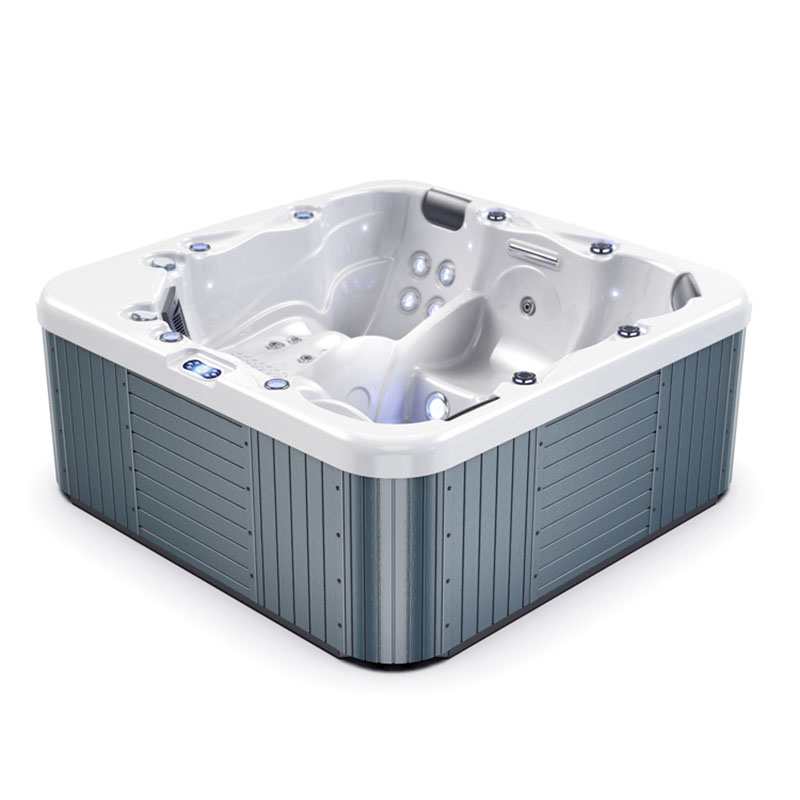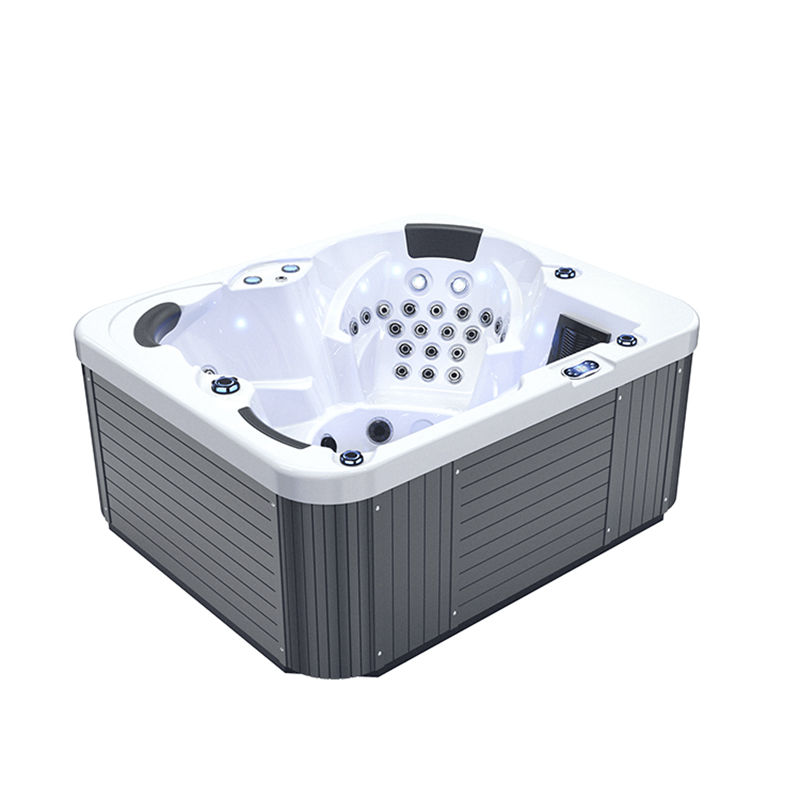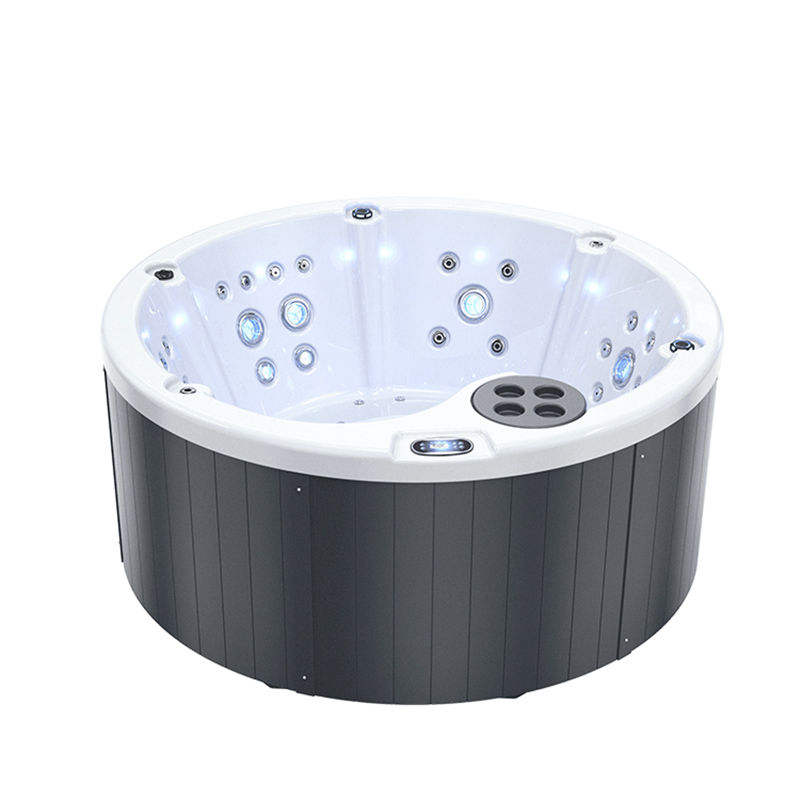While outdoor spa hot tubs offer relaxation and comfort, they also raise concerns about their potential impact on the environment in which they are installed. A common concern is whether spa hot tubs can corrode and damage decks installed on wood or other materials. Deck corrosion not only affects appearance but, more importantly, weakens structural strength, posing a safety hazard.
This article will delve into the potential corrosion risks of outdoor spa hot tubs on decks, analyze the factors that influence deck corrosion, and provide practical advice for preventing these issues.
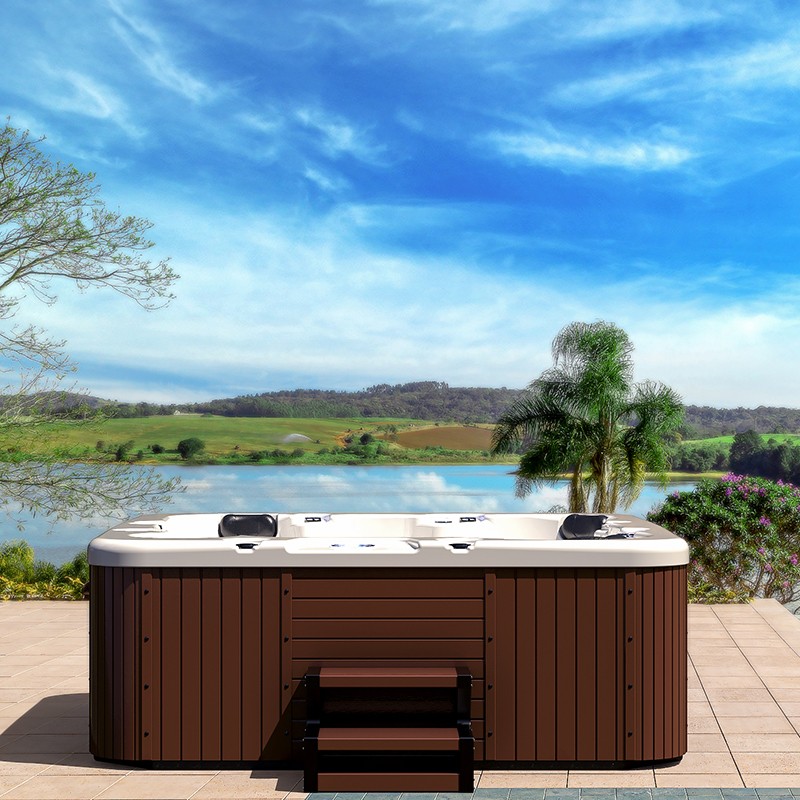
What is the relationship between spa hot tubs and decks?
When a spa hot tub is installed on a deck, the deck bears the weight of the spa hot tub, its full water content, and the weight of users. Furthermore, the operation of a spa hot tub creates a buildup of moisture, humidity, and chemicals, all of which can potentially affect the deck material, leading to corrosion and degradation.
The extent of deck corrosion depends on several factors, including the deck material, the chemical treatment used in the spa hot tub, weather conditions, and maintenance practices. Therefore, understanding how these factors interact can help prevent corrosion and extend the life of the deck.
1. Deck Materials
Decking decks are typically made from a variety of materials, including pressure-treated wood, composites, and metals, each with varying resistance to moisture, chemicals, and the outdoor environment.
• Pressure-treated wood: Commonly used for outdoor decks, it undergoes chemical treatment to improve corrosion resistance, but can still rot, warp, and weaken structurally with prolonged exposure to moisture and chemicals.
• Composites: Made from a blend of plastic and wood fibers, they are more corrosion-resistant and better withstand moisture damage, but can also degrade over time if not properly treated with chemicals.
• Metal decks: While rarely used as installation platforms for spa hot tubs, if present, special precautions must be taken to prevent the corrosive effects of chemicals.
2. Chemicals in Spa Hot Tubs
Maintaining the water quality of outdoor spa hot tubs often requires the addition of chemicals, such as disinfectants like chlorine or bromine, to control bacterial and algae growth. These chemicals can come into contact with the deck surface through evaporation, spills, or splashes, and over time, accumulation can corrode certain materials.
• Chlorine: Chlorine is a commonly used disinfectant, but prolonged exposure to chlorinated water or steam can corrode sensitive materials such as wood and metal.
• Bromine: Similar to chlorine, bromine is a widely used water treatment agent. While less corrosive than chlorine, it can still adversely affect certain materials.
• pH: Water with excessively high or low pH levels can accelerate corrosion. Therefore, maintaining a proper pH level is not only important for human health but also crucial for protecting your deck.
3. Environmental Factors
Outdoor decks are frequently exposed to the elements, such as wind, rain, snow, and sunlight. These conditions can accelerate corrosion, especially when an outdoor spa hot tub overflows, leaving the deck wet for extended periods. Long-term moisture can be particularly detrimental to wood decks, leading to wood rot, mold growth, and structural damage.
Additionally, the risk of corrosion increases if the installation area is located in areas with high humidity or frequent rainy seasons. These conditions increase the likelihood of the deck remaining wet, accelerating material degradation.
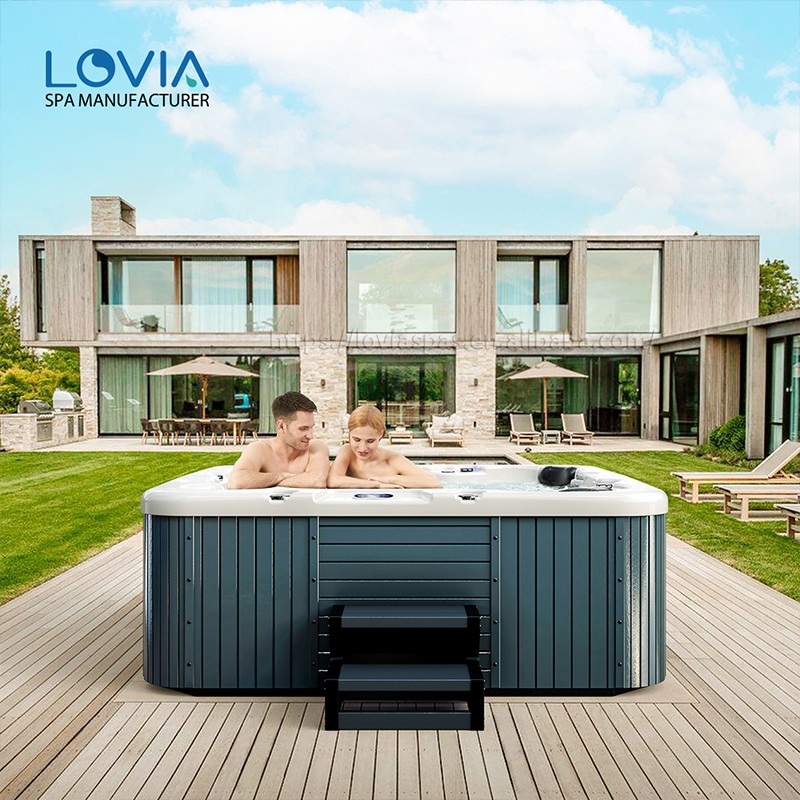
How does a spa hot tub affect deck corrosion?
Spa hot tub corrosion can primarily manifest itself in the following ways:
1. Wood Rotting and Deformation
Wood is the most common material used for outdoor decks, but it's also the most susceptible to moisture and chemicals. Over time, moisture can accumulate on the wood surface through steam or spillage, causing it to swell, warp, and even rot.
Wood decay typically begins externally, initially manifesting as discoloration and softening, before gradually developing into structural problems. Severe wood corrosion can compromise the deck's load-bearing capacity, leading to an unsafe condition.
2. Metal Corrosion
Decking containing metal components, such as supporting structures or joints, can develop rust due to long-term exposure to chlorine or bromine. Rust not only affects appearance but also weakens the metal, increasing the risk of fracture.
Although metal components are typically minor, they are a vital component of the deck's structure. Once corroded, they can compromise the overall safety of the deck.
3. Degradation of Composite Materials
Although composite materials are more corrosion-resistant than wood and metal, they can still degrade under high concentrations of chemicals or prolonged UV exposure. Common manifestations include discoloration, cracking, or brittleness. While these may not necessarily affect the structure, they can affect aesthetics and longevity.
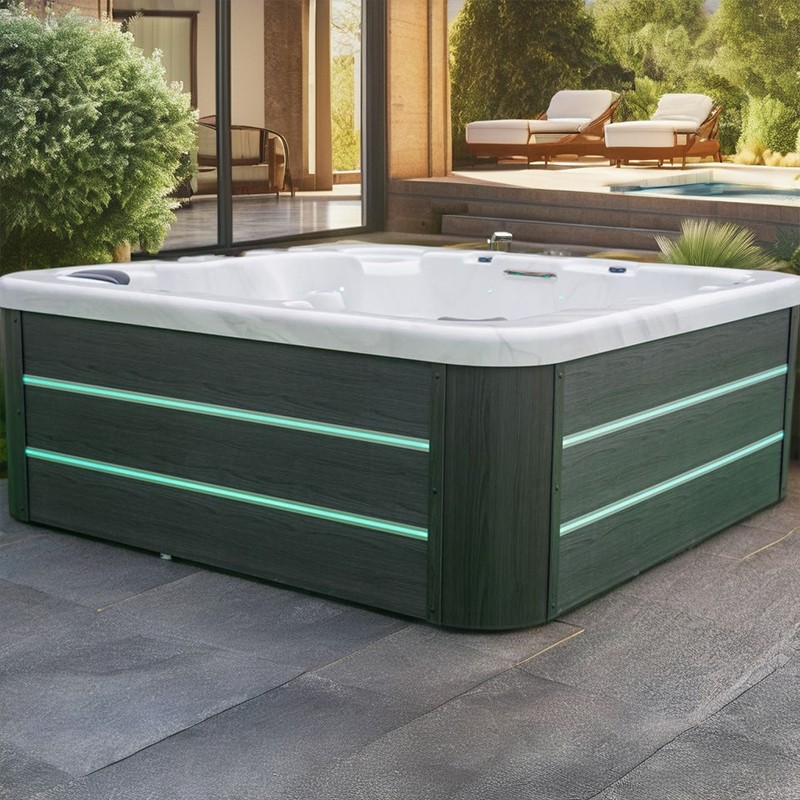
How can I prevent spa hot tubs from causing deck corrosion?
While spa hot tubs may pose a risk of corrosion to decks, proper preventative measures and maintenance can effectively minimize these effects and ensure the deck remains in good condition for a long time.
1. Regular Deck Cleaning
Regular cleaning is fundamental to preventing corrosion. Cleaning spills of chemical solutions, steam condensate, and other substances can reduce the accumulation of chemicals on the deck surface, thereby reducing the risk of corrosion. It is recommended to rinse the deck with clean water and avoid using strong acidic or alkaline cleaners.
For wooden decks, regularly clean the surface with a wood-specific cleaner to remove dirt and mold, keep the wood dry, and reduce moisture accumulation.
2. Maintaining Proper Water Balance
Water balance is not only crucial to the operation of your outdoor spa hot tub, but also to the protection of the deck. Maintaining water pH and chlorine or bromine levels within recommended ranges not only helps prevent bacterial growth but also prevents excessive corrosion of deck materials.
It's recommended to regularly test the chemical composition of your spa hot tub and make adjustments based on the results to ensure long-term water quality.
3. Install a waterproof mat or cover
To prevent moisture and chemicals from coming into direct contact with the deck, you can install a waterproof mat or cover underneath your outdoor spa hot tub. This type of protection effectively isolates moisture from penetrating the deck material, reducing the risk of corrosion.
Additionally, a cover can help prevent water from overflowing during heavy rain or extreme weather, further protecting the deck from damage.
4. Regularly Inspect the Deck Structure
Regularly inspecting the deck structure is an important safety measure. Check for rot, warping, or cracks in the wood, and for rust on metal supports to ensure the stability of the entire deck structure. If any problems are found, repair or replace them as soon as possible to prevent further problems.
5. Regularly Treat Wood Deck Structures
For wooden decks, annual anti-corrosion treatment is recommended, using a wood sealant or waterproof coating. These coatings form a protective film on the wood surface, reducing the attack of moisture and chemicals.
For composite materials and metals, while frequent treatment is not necessary, periodic application of an appropriate protectant can extend the life of the material.
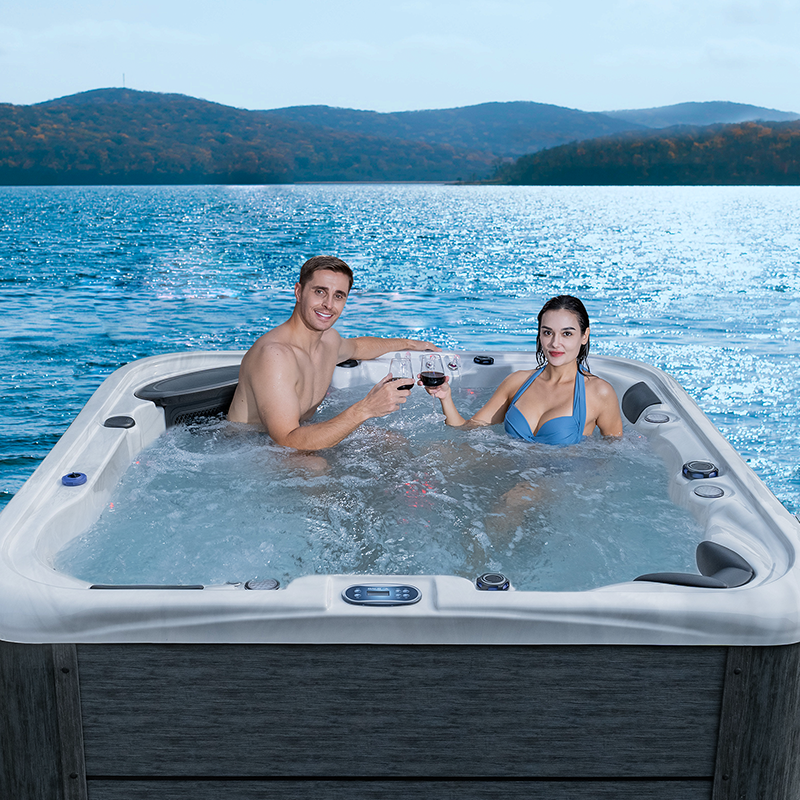
What industries or clients are your spas suitable for?
Our spa and hot tub products are ideal for resorts, wellness centers, hotels, gym clubs, real estate developers, and homeowners. We also work with importers, wholesalers, and e-commerce brands worldwide. Whether you're in hospitality or retail, we provide factory-direct support, high-quality spas, and competitive pricing.


